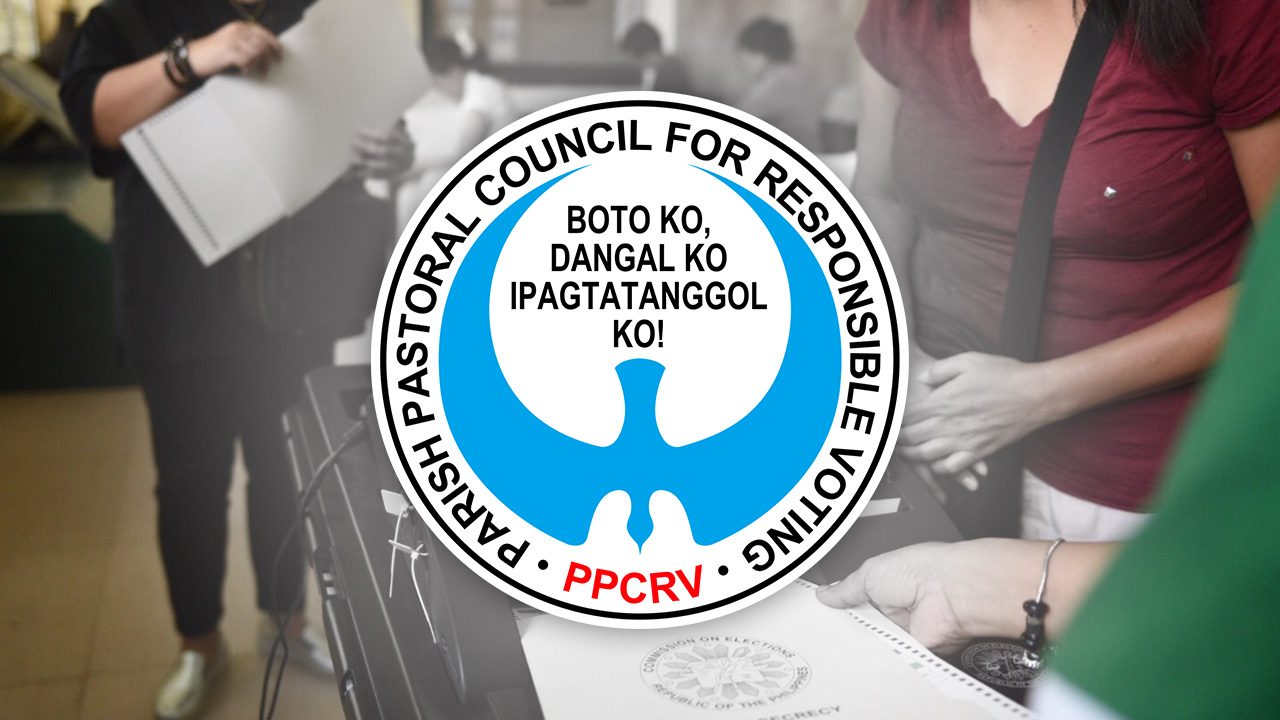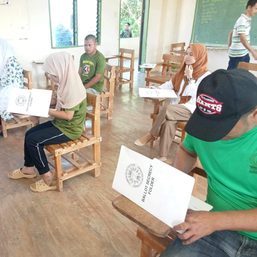SUMMARY
This is AI generated summarization, which may have errors. For context, always refer to the full article.

MANILA, Philippines – The leadership of election watchdog Parish Pastoral Council for Responsible Voting wrote a letter addressed to all its coordinators and volunteers, assuring them that PPRCV would have been the first to speak up if the group saw proof of election rigging in the 2022 polls.
The PPCRV Board of Trustees saw the need to formally communicate to all its members amid persistent “claims that cloud the legitimacy of the 2022 elections.”
“We in the PPCRV Board of Trustees are obligated to spare you, our beloved coordinators and volunteers from confusion and anxiety brought on by unsubstantiated accusations and unproven allegations regarding the 2022 national and local elections. So that with facts and material evidence that we hold, we can together fearlessly spread the truth and defend what is fair and right in our electoral process,” the letter dated August 29 read, a copy of which was obtained by Rappler on Friday, September 1.
PPCRV is a reputable poll watchdog which began monitoring Philippine elections since 1992, deploying thousands of volunteers nationwide on voting day. It is an accredited citizen’s arm of the Commission on Elections (Comelec).
What did the letter contain?
PPRCV sent a 10-page letter to members, seven pages devoted to explain in layman’s terms theories on election rigging raised primarily by IT experts collectively known as “TNT Trio.”
PPCRV did not mention the group – led by former Philippine ICT chief Eliseo Rio – in its letter.
The poll watchdog addressed three specific issues:
- The use of a single, private IP address
- The surge in the transmission of election returns (ERs) in the first two hours after the closing of polls
- The use of “man in the middle” (MITM) during the transmission
How did PPCRV answer the issue surrounding the IP address use?
Rio’s most popular argument yet is that the Comelec’s use of one private IP address for the count was a proof of poll rigging.
PPCRV explained that the use of a single IP address – whether public or private – is a common practice, made possible by the so-called Network Address Translation (NAT), a “legitimate technique used by corporations, service providers, and telcos.”
Globe and Smart have confirmed using NAT to connect the vote-counting machines via the internet.
“There is nothing illegal about this technique and it is a very common way to preserve and optimize IP addressing practiced across the world,” PPCRV said.
What did the PPCRV say about MITM attack allegations?
PPCRV also insisted that the reuse of private IP addresses is not tantamount to a security breach also known as MITM attack.
“A man-in-the-middle (MITM) attack can happen to any network no matter what IP address or technology is used. The aim of a MITM attack is to maliciously intercept and alter communications between a sending and receiving party without their knowledge,” PPCRV wrote.
“Thus, in our election, the very real proof of a man-in-the-middle attack is when results we see in physical ERs that are printed before transmission when compared with the results received by the transparency server (and other downstream servers, for that matter) after transmission has a discrepancy,” it added.
PPCRV conducted a parallel count for the 2022 elections, matching electronically transmitted ERs with physical copies printed by the vote-counting machines. The process yielded a 99.84% accuracy rate.

Rio’s claim, however, was that the VCMs had been pre-programmed.
This is a concern among automated election skeptics and advocates for hybrid elections – yes, the VCM prints a receipt right after they feed their ballots to the machine, allowing them to check whether it read their ballots correctly, but they doubt that the VCM really tally their votes properly.
However, a random manual audit of votes for the 2022 polls led by the Legal Network for Truthful Elections (Lente), a process that checks whether vote-counting machines tallied the ballots fed into it accurately, yielded a 99% accuracy rate.
But why was the transmission of results so fast?
Former senator and defeated 2022 vice presidential aspirant Kiko Pangilinan previously echoed a common sentiment online – how the Philippines, a country that grapples with slow internet, had an election where the votes came in fast.
PPCRV, however, insisted that the printing of ERs and the transmission of results can be done in less than 30 minutes, rebutting a key argument presented by Rio’s group.
The watchdog said it conducted its own log timing analysis of the VCM transmission time stamps.
“This means that we looked at the VCM IDs in log files, got the corresponding times of send, and matched these against the logs and times from the results file of the Transparency Server for added measure, it explained.
“A large number of precincts were able to transmit the ERs to the transparency server within 30 minutes after closing of the polls. The timings of the transmission when compared to the transmission logs matched accurately. This explains the build-up of transmissions during the first two hours after the closing of the polls,” the group added.

Challenge to skeptics
While the letter was addressed to volunteers, PPCRV also posed a challenge to people who continuously question the legitimacy of the automated polls.
The group said that those claiming that the transmission of election results was manipulated carry the burden of proof to support their theory.
“The PPCRV has physical evidence and match rates, to show that results were not altered during transmission in 2022 to change overall results. Can the parties making accusations of fraud show any tangible proof of fraud?” PPCRV wrote.
For the record, even the National Citizens’ Movement for Free Elections (Namfrel) said it had yet to see compelling evidence that there were irregularities in the transmission of results.
Namfrel’s gripe with the Comelec includes the watchdog’s pending request for documentations in relation to how the vote-counting machine system hash code was built, since it noticed there had been discrepancy.
Another is the commission’s inability to of election transmission logs, saying what the poll body released earlier this year was just reception logs.
Read PPCRV’s letter to its volunteers and coordinators here:
While watchdogs did not rally behind automated election skeptics, they flagged “lingering issues and challenges,” such as VCM breakdowns, the Comelec’s poor contingency planning, and rampant vote-buying.
The 2022 elections – arguably the most divisive yet in history – brought the Marcoses back to power 36 years after the People Power Revolution ousted them from Malacañang.
Dictator’s son and namesake Ferdinand Marcos Jr. garnered 31 million votes, becoming the first majority president since 1986.
Fact-checking organizations noted that the incumbent president was the top beneficiary of poll-related disinformation in 2022.
Check our other stories on the legitimacy of the automated election system in 2022:
- NAMFREL, PPCRV debunk myths of electoral fraud in 2022 polls
- The ‘constant 47% ratio’ explained
- Robredo: We did not see evidence of cheating in 2022 elections
- Pangilinan seeks clarity on 2022 poll results but avoids ‘premature conclusions’
- 2022 polls: Where are we on issues of VCM ‘discrepancy,’ transmission logs?
- [WATCH] In The Public Square with John Nery: Preloaded elections?
- [WATCH] In the Public Square with John Nery: Is Rio wrong? The 2022 elections and ‘automated cheating’
– Rappler.com
1 comment
How does this make you feel?





Firstly, why would the Parish Pastoral Council For Responsible Voting (PPCRV) “indirectly” help the Commission on Elections (COMELEC) in answering the issues raised by the TNT Trio? This is an “indirect” help to COMELEC because the TNT Trio raised such issues to the COMELEC and NOT to the PPCRV. In addition, it is also “indirect” help because although its letter was addressed to all its members, yet it can unintentionally influence nonmembers, too, especially those critical of the COMELEC’s answers and actions to the election-rigging issue.
Perhaps, the communication was even secretly intended more to nonmembers and less for its own members, which would benefit COMELEC and certain political groups.
Secondly, this is also an “unsolicited” help to COMELEC because COMELEC was never known to have asked the PPCRV for help on this issue.
So, what is the motive behind this “indirect and unsolicited help”?
Is the hidden purpose of the PPCRV is to please COMELEC so that the latter will maintain the former’s accreditation as the COMELEC’s citizen arm in the coming elections? And by doing so, PPCRV could
continue enjoying the corresponding benefits, perks, privileges and rewards (and bribes?), which come with being the COMELEC’s citizen arm?